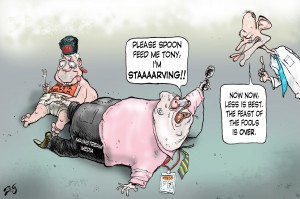It seems that plain packaging hasn’t reduced Australian smoking rates so far, according to this report from London Economics, so you might think that it fails to meet its policy targets. And that might be the case if you accept that the previous government’s only aim with this policy was to cut smoking rates.
But combine this fact with the information from yesterday’s post and plain packaging actually makes it easier for the government to meet or exceed its fiscal targets from the tax.
What appears to be happening is that smokers are now paying less to smoke. As tobacco excise is paid per stick, this has zero effect on government revenue, while reducing the proportion of smokers’ budgets directed to their habits.
The former government proposed hiking excise rates to raise a further $5.3 billion. One of the issues in doing this would have been how elastic demand for cigarettes is. We know that it is pretty inelastic, but there had to be some give.
But now that we know that smokers are moving down the cost curve with their habit, their ability to pay has increased and the elasticity question ceases to be as large a concern. Furthermore, if the government’s assumptions were correct, the shift down the cost curve leaves room for yet higher excise hikes in future.
The only potential fly in the financial ointment is the issue of how much is creamed-off by “illicit” tobacco. The tobacco industry says this will be significant, but now courtesy of the tobacco industry we have the answer. This report, prepared for BAT by KPMG estimates the loss to government revenue from the increase in the illicit tobacco market at $1 billion in 2012/2013.
The report implies this is the result of a 25% excise hike in 2010, and it might have been, but it is hard to be sure of this from their graph as there is a major increase in consumption of illicit tobacco which seems to occur immediately prior to the excise hike, and which has stayed fairly stable thereafter.
However, if the KPMG analysis is correct it is quite possible that the extra $5.3 billion, projected over 4 years, may never arrive in government coffers, suggesting that the government will need to hike the excise even higher to pay for the spending commitments already made with the anticipated revenue.
Apparently, as of February 2013, the federal government had no idea what effect the excise had on revenue. In a “Post Implementation Review” of the increase in excise Treasury says:
The measure was anticipated to raise an extra $5 billion over five years which would be invested in better health and hospitals. An ex‑post analysis of extent of the additional tax revenue received is not available.
which is curious, to say the least.
So, the takeout from all of this is that the winners from plain packaging are:
- Smokers, because they’re now spending less on their habit
- Illicit tobacco producers and sellers, because there is increased take-up of their product
- The federal government, because they have more room to increase excise (although they have to be careful this isn’t outrun by losses through illicit tobacco consumption)
And the losers are the tobacco companies, who no longer get a premium price for their product, the premium being shared between consumers, crooks and the government.


